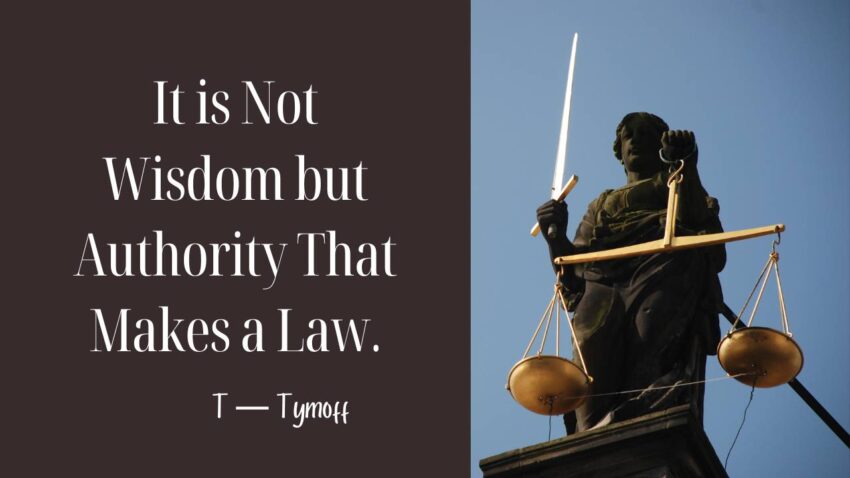Laws are everywhere that shape how we live, work, and even think. But have you ever considered who or what truly makes these laws? One such wise statement, “It is not wisdom but authority that makes a law. t – tymoff” challenges us to rethink the foundation of our legal systems. It’s a bold statement that cuts through the idealistic notion that laws are always fair or just. Instead, it exposes a more uncomfortable truth. Laws often reflect the will of those in power, not necessarily what is wise or right.
Understanding this dynamic is necessary in a world where authority can overshadow common sense. Let’s uncover why authority often rules the day when it comes to the laws that govern us.
Understanding Law and Authority
A law is a system of rules to regulate behavior within a community, society, or country. It’s like a traffic light that tells us when to stop and when to go. Laws aim to maintain order, protect rights, and ensure justice. But who decides what these rules should be?
Authority is the power or right to enforce laws, make decisions, and command obedience. It’s the muscle behind the law, like the traffic cop who enforces the traffic light’s rules. It is the authority that makes and enforces laws. Authority, whether it be a king, a president, or a governing body, is the force that establishes laws. A law is just an idea on paper without authority.
Wisdom vs. Authority in Lawmaking
Wisdom involves sound judgment, knowledge, and a deep understanding of human nature. Ideally, wisdom should guide the creation of laws that promote justice, fairness, and the greater good.
Authority is not necessarily wise. It can make laws based purely on power dynamics, self-interest, or political gain. Unlike wisdom, which considers the broader impact on society, authority may prioritize maintaining control or upholding certain power structures.
Consider the prohibition era in the United States. The law, driven by authority, banned alcohol to enforce moral standards, but it lacked wisdom in understanding societal behaviors, leading to unintended consequences like the rise of organized crime.
Meaning of “it is not wisdom but authority that makes a law. t – tymoff”
Thomas Hobbes statement suggests that law is often a product of power rather than prudent thought. It challenges the assumption that laws are always made for the public good, revealing that they can also serve those in power. If laws are made by authority rather than wisdom, they may not reflect the true needs of society.

This view prompts us to question and critically evaluate the laws governing us. Some argue that authority is necessary for law and order and that wisdom alone cannot enforce laws. However, a system without wisdom risks creating unjust and oppressive laws.
Historical Perspective of Ancient Laws and Their Authorities
Understanding the historical context of lawmaking helps us see how authority has shaped laws across time.
1. The Code of Hammurabi: The First Known Written Laws
One of the earliest examples of lawmaking comes from ancient Mesopotamia, around 1754 BC, with the Code of Hammurabi. Hammurabi, the king of Babylon, established a set of laws carved into a stone stele for all to see. These laws covered everything from property rights to family relations and criminal justice.
The Code of Hammurabi was significant not because it was based on wisdom but because it reflected the absolute authority of the king. Hammurabi claimed that the laws were given to him by the gods, which gave his authority a divine mandate. This allowed him to enforce laws strictly and punish those who disobeyed. However, many of these laws were harsh and reflected the hierarchical structure of society, where those with more power or wealth received lighter penalties than the poor or enslaved.
2. Laws of Ancient Egypt: Divine Authority of Pharaohs
Pharaoh was portray as a living god in the ancient Egypt and this divine status gave him absolute authority over the land and its people. Laws were considered decrees from the pharaoh, who was believed to maintain the order given by the gods, known as Ma’at.
The laws in Egypt covered everything from agriculture to family life and were strictly enforced. The pharaohs used their authority to enact laws that supported their divine rule and maintained the existing social order. The wisdom or fairness of these laws was less important than their role in reinforcing the pharaoh’s authority and control over the populace.
3. Feudal Laws in Medieval Europe
During the medieval period in Europe, lawmaking was heavily influenced by the feudal system, where kings and lords held significant authority over their territories. They create laws to benefit the ruling classes and protect their interests. For example, feudal laws included regulations on land ownership, taxes, and vassal obligations.
The Magna Carta of 1215, while seen as a document of liberty, was primarily a result of a power struggle between King John of England and his barons. It was an attempt to limit the king’s authority, not necessarily a document rooted in wisdom or fairness for all.
Modern Perspective on Authority and Law
You know who said it is not wisdom but authority that makes a law. t – tymoff? The famous 17th-century philosopher Thomas Hobbes said it in his book “Leviathan.” As we transition from ancient to modern times, the nature of authority in lawmaking has changed. Here is the perspective on how authority shapes the laws we live by.

1. Governmental Authority and the Law
In modern societies, authority in lawmaking is primarily vested in elected bodies such as parliaments, congresses, or legislatures. These institutions have the formal power to create, amend, and repeal laws. Despite democratic processes, these bodies exercise significant authority over what becomes law.
Political agendas, lobbying, and party politics often drive the creation of laws. Even in democratic contexts, laws can sometimes reflect the interests of powerful groups rather than the broader wisdom or needs of the general population.
2. Judicial Authority and the Role of Courts
Courts and judicial systems also hold authority in interpreting and enforcing laws. While judges and courts only act with wisdom and impartiality, their authority enables them to make binding decisions that shape legal norms and practices. This judicial authority is necessary for maintaining the rule of law but can also be contentious when courts overstep their role.
3. Regulatory Authorities and Executive Power
Modern governments often delegate lawmaking powers to regulatory agencies and executive branches. These bodies can create rules and regulations that have the force of law. For example, federal agencies like the Environmental Protection Agency (EPA) or the Federal Communications Commission (FCC) can make regulations impacting millions of people in United States. These regulatory authorities wield significant power, often without direct input from the public, which can lead to concerns about accountability and transparency.
Equilibrium Between Wisdom and Authority
To create laws that are fair and just, we must integrate wisdom into the process. Consult the public, think ethically, and understand what laws mean long-term. Lawmakers should exercise their authority with moral insight, ensuring laws are not only enforceable but also just and equitable. It’s like using a compass to guide decisions, not just a map.
Laws such as the Civil Rights Act are actually according to both authority and wisdom. They balanced the need for order with a deep understanding of human rights and social justice.
Case Studies of Authority Over Wisdom
Thomas Hobbes saying, “It is not wisdom but authority that makes a law,” highlights lots of historical and contemporary examples. Here are some case studies:
- Apartheid in South Africa was a prime example of authority-driven lawmaking. The white minority government enacted laws that enforced racial segregation and discrimination against the black majority. The idea behind these laws was to maintain white dominance and control, regardless of their injustice.
- Colonial Laws in British India were also driven by authority, rather than wisdom. The Rowlatt Act allowed for imprisonment without a trial. It was designed to suppress dissent and maintain British control.
- Anti-Homelessness Laws in modern cities often prioritize aesthetics and public image over addressing the root causes of homelessness. These laws criminalize activities like sleeping in public or panhandling without offering alternatives.
What Are the Dangers of Authority Without Wisdom?
History is full of such laws made by pure authority without wisdom. Colonial laws that suppresse entire populations without considering their rights and dignity. Authoritarian lawmaking has led to revolutions, civil wars, and societal collapse. It shows that authority without wisdom is a recipe for disaster. Laws that restrict freedom of speech in various countries show how authority, without a grounding in wisdom, can stifle progress and justice.
Conclusion
Laws are more than just rules; they shape the society we live in. Thomas Hobbes assertion that “it is not wisdom but authority that makes a law. t – tymoff” challenges us to reflect on the forces behind lawmaking. While authority is necessary for enforcing laws, wisdom must guide it to ensure justice and fairness. A balance between these two elements is necessary for a just and equitable society.

